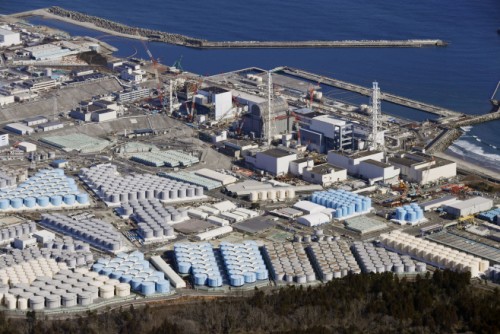 |
| The storage tanks for treated water at the Fukushima Daiichi nuclear power plant in Fukushima prefecture, Japan./ Source: Yonhap News |
AsiaToday reporter Lee Jang-won & Tokyo respondent Uhm Soo-ah
The Japanese government decided Tuesday to release 1.25 million tons of radioactive water from the wrecked Fukushima nuclear plant into the ocean. The South Korean government immediately expressed strong regret, calling the decision “outright unacceptable”, and summoned Japan’s ambassador to Seoul to protest the plan. “We will take all necessary steps with the safety of our citizens as the top priority,” the South Korean government said. However, the problem is that it is hard to find appropriate countermeasure. Besides, the United States and China are showing difference positions on the issue, further deepening South Korea’s diplomatic burden. While the U.S. expressed support for Japan’s decision, China hit out at the move, calling it “irresponsible one-sided decision.”
Releasing all of the contaminated water is expected to take decades once the process begins in 2023. The contaminated water contains radioactive material tritium, which can impact the marine environment, food safety and human health. Tokyo Electric Power (TEPCO), which has stored the radioactive water in tanks at the Fukushima Daiichi plant since the 2011 meltdowns, plans to dilute the contaminated water before releasing it through the Advanced Liquid Processing System (ALPS) so that some harmful substances can be reduced to allowable levels. The dilution process won’t remove tritium from the water but could dilute it to one-40th of the concentration permitted under Japanese safety standards.
Immediately after Japan’s decision, the South Korean government convened an emergency vice-ministerial meeting presided over by Koo Yoon-cheol, head of the Office for Government Policy Coordination, and strongly protested. Prime Minister Chung Sye-kyun, who returned home after his visit to Iran, wrote on his Facebook, “(The move) is an irresponsible decision that violated the rights of the citizens of neighboring countries.”
The ruling and opposition parties also condemned Japan’s decision. “The unilateral decision despite opposition from the international community is a shameless and selfish act,” said Choi Ji-eun, the ruling Democratic Party’s (DP) international spokesperson. “We express strong regret over the Japanese government’s irresponsible decision,” said Yoon Hee-seok, the spokesperson of the main opposition People Power Party (PPP).
The foreign ministry called in Japanese Ambassador to Seoul Koichi Aiboshi to express regrets and lodge a protest. The government plans to refer its concerns to the International Atomic Energy Agency (IAEA) and request the international community to objectively review safety issues related to the Fukushima water release.
Japan’s decision also prompted criticism from its local fishing industry. Japan’s National Federation of Fisheries Cooperatives strongly opposed the move, calling it “utterly unacceptable” and held a rally in front of the Japanese Prime Minister’s residence to protest the decision.
While the international community is also expressing concerns, the U.S. and China have different views. The Chinese government expressed it disapproval, saying that Japan had unilaterally decided to release the Fukushima nuclear wastewater into the sea without consultation with the international community. “This will severely affect human health and the immediate interests of people in neighboring countries,” the Chinese foreign ministry said. However, the United States defended Japan’s decision, saying, “Japan appears to have adopted an approach in accordance with globally accepted nuclear safety standards.”
#South Korea #Japan #contaminated water #radioactive #titan
Copyright by Asiatoday
Most Read
-
1
-
2
-
3
-
4
-
5
-
6
-
7





















